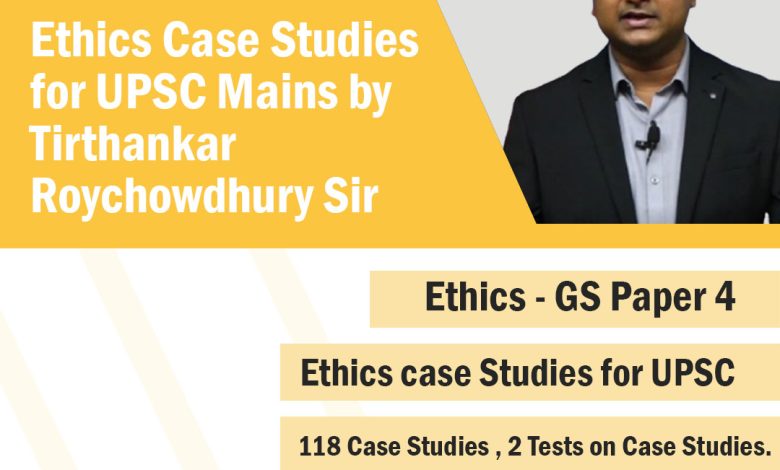Special emphasis on Ethics case studies for UPSC?

Looking for an Ethics course? Don’t forget to knock on Eden IAS’s door.
Known for the best Ethics faculty and the best Ethics course, Eden IAS is located in Karol Bagh. The coaching institute works with the aim of making students understand a subject as tactical as Ethics in the most lucid manner. Usually, the Ethics course demands a lot of patience and your brain cells working to their best capacity since half of the paper comprises Ethics case studies for UPSC. These application-based case studies UPSC require proper analysis and should be approached in the right manner to fetch handsome marks. Let’s see what Eden has to offer for Ethics.
Eden IAS and Ethics
Eden IAS offers a course called “Ethics GS4 Foundation course” taught by Mr. Tirthankar Roychowdhary. He is the jewel of Eden, and with no iota of doubt, the best teacher for Ethics in Delhi. In the Ethics GS4 Foundation course, Eden offers the following:
- A1 Faculty: Well, we cannot deny the fact that at the end of the day all that matters is the faculty. You won’t be studying from shiny tables or smart boards or glass doors for that matter. Eden IAS’s best faculty member Mr. Tirthankar Roychowdhary has an unprecedented command over the subject. He makes sure that students are able to grasp the complex concepts of Ethics easily.
- Study material: After faculty, it is the study material that matters a lot. Eden IAS provides faculty-curated study material for Ethics. These include 6 booklets such as Theoretical Framework, 70 Thinkers & Thoughts, Ethics workbook on case studies UPSC, and Glossary for Ethics along with 2 revision snippets. They are more than sufficient for the Ethics paper and help you in preparing as well as revising the complete syllabus for GS-IV.
- Mode: This course is available in both online and offline modes letting you choose the one you are comfortable with.
Special emphasis on Ethics case studies for UPSC
Under this course, a special emphasis is laid on Ethics case studies for UPSC. As per Mr. Tirthankar Roychowdhary, there are multiple approaches to attempt a case study but his favourite is the “generic 10-step approach”. In this approach, we aim to solve a case study with the desired word count systematically and in 10 steps. Steps 2 to 7 are earmarked as the steps of ethical mapping.
Please Must Read: How Should I Start Preparing For Ethics book for UPSC?
Step 1: Factual summary
Here, one has to identify the facts stated in the question.
Step 2: Stakeholders
Identifying the stakeholders is the next step. You need to categorize them as specific/primary stakeholders or generic/other stakeholders.
Step 3: Interests
The next step involves identifying the interests of the stakeholders.
Step 4: Conflict of interests
This involves highlighting the situations where you can spot a clash between two interests.
Step 5: Values hidden in their interests
Every interest has an underlying value. Values form the basis of interests. Whenever there is a clash of value, the situation becomes “ethica dilemma”.
Step 6: Situations of Ethical Dilemma
This step involves overcoming the situations of ethical dilemma or ethical paradox.
Step 7: Options
Outline the options you have for the question. In case you are given the option, then simply evaluate their merits and demerits.
Step 8: Give an ethical judgement
Pick an appropriate option and give an ethical judgement.
Step 9: Justifying ethically
Using moral theories and philosophies, one has to justify their stated ethical judgement ethically.
Step 10: Conclusion
You can nicely conclude your answer with a slogan, quote or a statement.
So, what are you waiting for? Make Ethics case studies for UPSC easy with Eden! Enroll now.








